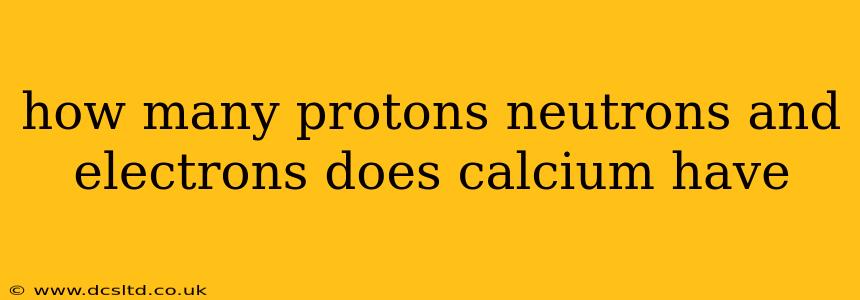How Many Protons, Neutrons, and Electrons Does Calcium Have?
Calcium, a vital element for human health and numerous industrial applications, is readily identifiable on the periodic table by its atomic number 20. This number directly tells us the number of protons and electrons in a neutral calcium atom. However, determining the number of neutrons requires a closer look at isotopes. Let's break down each subatomic particle:
How Many Protons Does Calcium Have?
The atomic number of an element is equal to the number of protons in its nucleus. Therefore, calcium has 20 protons. This is a fundamental characteristic of calcium and doesn't change regardless of the isotope.
How Many Electrons Does Calcium Have?
In a neutral atom, the number of electrons equals the number of protons. This maintains a balanced electrical charge. Thus, a neutral calcium atom has 20 electrons. However, it's important to note that calcium can lose electrons to form ions (positively charged Ca2+ ions), commonly found in compounds. In this ionic state, it would have fewer electrons.
How Many Neutrons Does Calcium Have?
This is where things get a little more complex. Calcium has several isotopes, meaning atoms with the same number of protons (20) but differing numbers of neutrons. The most common isotope, Calcium-40 (⁴⁰Ca), accounts for about 97% of naturally occurring calcium. This isotope has 20 neutrons (40 total nucleons - 20 protons = 20 neutrons).
Other stable isotopes of calcium exist, including ⁴²Ca, ⁴³Ca, ⁴⁴Ca, and ⁴⁶Ca, each with a different number of neutrons. The number of neutrons can be calculated by subtracting the atomic number (number of protons) from the mass number (total number of protons and neutrons).
What are the different isotopes of calcium and their neutron counts?
Here's a table summarizing some of the stable isotopes of calcium:
| Isotope | Mass Number | Number of Neutrons | Natural Abundance (%) |
|---|---|---|---|
| ⁴⁰Ca | 40 | 20 | ~97 |
| ⁴²Ca | 42 | 22 | ~0.65 |
| ⁴³Ca | 43 | 23 | ~0.14 |
| ⁴⁴Ca | 44 | 24 | ~2.1 |
| ⁴⁶Ca | 46 | 26 | ~0.004 |
It's important to note that there are also radioactive isotopes of calcium with even more neutrons. However, these are not naturally occurring and are usually produced artificially.
What is the significance of the number of protons, neutrons, and electrons in an atom?
The number of protons defines the element. The number of electrons determines the atom's chemical reactivity. The number of neutrons affects the atom's mass and stability (some isotope combinations are radioactive). Understanding the composition of an atom is crucial to comprehending its properties and behaviour.
